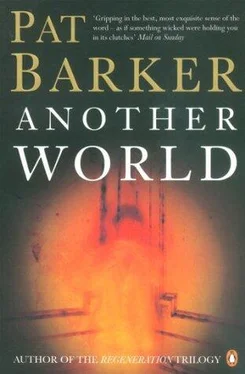But is he? Perhaps he’s as rebellious and afraid as Nick himself would be? He’s had so much longer than most people can hope for — he’s almost not allowed to want to live.
‘You sleeping all right?’
‘Not bad.’
He’s looking along the ward now, watching Ian’s slow progress from bed to bed. Despite saying he can’t eat, he’s looking forward to his lunch, though perhaps only because mealtimes give shape to the endless amorphous hospital days.
Ian reaches the bed. He’s a pink-skinned plump lad with fair wavy hair and a buoyant manner. ‘Do you want it there, Mr Lucas, or would you rather have it in bed?’
Seeing his chance, Geordie says, ‘Bed. I can’t manage it here.’
Ian on one side, Nick on the other, they lift him as gently as they can and yet he’s hurt badly, biting his lip, grunting, finally letting his head fall back against the pillows. They leave him for a while, then straighten his legs out.
Ian hesitates, looking at the five beds he still has to do.
‘Put it on the table,’ Nick says. ‘I’ll help him.’
It’s a few minutes before Geordie can take any interest in food at all, and when he tastes it he’s not thrilled. ‘Iron filings,’ he says, not grumbling, he knows perfectly well the taste’s in his mouth.
‘Try to eat a bit.’
Nick watches him chew, thinking that any nourishment now can only prolong the agony and that perhaps he ought to be encouraging him not to eat. He thinks of Paul Morel diluting his mother’s milk so that it won’t nourish her. Finally poisoning her, partly in compassion, partly in unconscious revenge because her milk had poisoned him. And that sets off another train of thought about ambivalent relationships and the dangers of euthanasia. Then he realizes what he’s thinking and drags his thoughts back to the ward. It seems unforgivable, when there’s so little time left, to wander off like that.
Geordie’s getting tired. Nick takes over, spooning mashed potato and gravy into the toothless mouth. Sometimes the pap’s regurgitated, and has to be caught on the spoon and reinserted. It’s like feeding Jasper; he’s an expert. He gets half a dozen spoonfuls in before Geordie waves him almost angrily away. ‘That’ll do,’ he says.
Nick pushes the wheeled table to the foot of his bed and settles him back more comfortably on the pillows. ‘Tea?’
‘Aye, go on.’
Nick tips the beaker and a little dribbles into Geordie’s mouth. He watches the bulbous Adam’s apple jerking as he drinks.
‘That’s enough, son.’
Son, Nick thinks. Yes. Fair enough.
*
When Nick was growing up Grandad’s silent presence in the house had been only one more oddity in the way their lives were lived.
Nick’s father was the Headmaster of a small preparatory school; his mother was the Matron. As a small boy he was always aware of another world on the other side of the door in the hall, though until he was seven he was forbidden to enter the school.
Every Sunday, in term, half a dozen boys would come to tea, sitting out on the lawn in summer on their best behaviour, making polite conversation in high-pitched self-confident voices. Once when Nick was almost seven one of the boys met him accidentally in the hall and gave him a Chinese burn. Not for any reason. He just did. Nick’s eyes watered. ‘Don’t tell,’ the boy said, going out on to the lawn. Nick stared at the red marks left by his fingers and pulled his sleeve down to hide them. Then he went and sat at the table and watched the boy’s mouth moving delicately up and down as he chewed a piece of cake. He didn’t say anything, and when Mummy came in to say goodnight he didn’t say anything then either. He lay in the dark, not bothering to wonder why the boy had done it. It was just something that happened. He hadn’t known that before, but he recognized it now.
When he was seven he went through the door in the hall and into his father’s school and the door closed quietly behind him, with a small puff of sound.
The two worlds smelled different: furniture polish, Mummy’s scent, good cooking, clean carpets one side of the door; custard, boiled cabbage, gym shoes, Jeyes fluid, grey wool, small-boy smell on the other. His father, who was immensely tall and towered over the bed when he came upstairs to say goodnight, became an even taller man on a platform saying prayers. When you met him in the corridors you had to remember to call him Sir. For the first few weeks he was ‘Da-Sir’, but Nick learned quickly. He had to. ‘Mummy’ was more difficult because it started with the same letter as Matron. He never called her Mummy at school, but he often called her Matron at home, once at a family tea party and all the aunts and uncles laughed. Nick didn’t think it was funny. (Forty years on, with children of his own, he knows it wasn’t funny.)
Life was full of traps. Nick’s father had the essential apparatus of a good disciplinarian: eyes in his arse. He knew about the smoking in the copse behind the school, he knew which boys slipped out between prep and dinner to lay bets at the local betting shop, he knew who was being bullied and who was doing it, just knew, but the boys didn’t believe that. Nick was always suspected of telling tales, though he said nothing, clammed up about school as soon as he was safely on the other side of the door. All the temptations to betray were the other way round.
Very few boys were prepared to risk the charge of ‘sucking up’ by becoming his friend, and he was desperate to belong. Once, when he was eleven, they were all talking about sex. Did the Queen and the Duke of Edinburgh do it? No, they unanimously decided. The Vicar and his wife? No. Mr Halford and Matron? Sidelong glances at Nick, giggles.
‘Yes,’ he said. ‘I heard them.’
Later, one of the boys, the one he most wanted to have as a friend, said, ‘You shouldn’t have said that.’
Nick became a spectacularly devious child. Every second of every day was supervised by Da-Sir or Mu-Matron; the only privacy was inside his head. He lied automatically all the time about everything. Once when he was a teenager his mother came into his bedroom and asked him what he was reading. Kidnapped , he said, quick as a flash, pushing Treasure Island out of sight under his pillow. But lying, he soon realized, wasn’t enough. However good you were, you made mistakes. You had to be two people, one in each world, and in each world you had to forget the responses of the other.
Only Grandad, silent, wreathed in blue cigarette smoke, never changed; belonged only to one world.
His face, yellow against the white cloth of the pillows, doesn’t change much now either, though fugitive expressions pass across it rather like the mouthings of newborn babies, reactions generally to what’s going on in their guts. His are like that too, his whole attention focused inwards on managing the pain. A white line runs from his temple to the centre of his cheek, an old wound, as much a part of him now as the colour of his eyes. It’s difficult to believe he wasn’t born with it, though he’d lived the first eighteen years of his life without it. Another inch to the left and it would have taken out the eye.
Nick wonders whether he should go now, or at least walk along to the visitors’ café and have a cup of coffee, give Grandad a break, but he no sooner stands up with this in mind than Grandad says, ‘Don’t go.’ It’s the first sign he’s shown in the last ten minutes that he’s aware of Nick’s presence.
‘Where’s the pain?’ Nick says.
‘Down there. Like always wanting to shit.’
‘Do they give you injections?’
‘Just pills.’ He rouses himself slightly. ‘Do you know they shaved me legs as well?’ He hoists himself up the bed. ‘I says, “What you shaving them for?” It was Ian. He says, “Don’t blame me. Sister’s a navel-to-knee woman. You lose your bush round here if you’re having your tonsils out.” ’
Читать дальше












